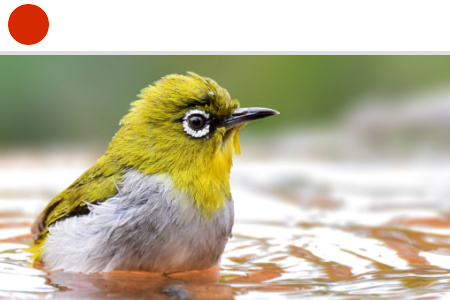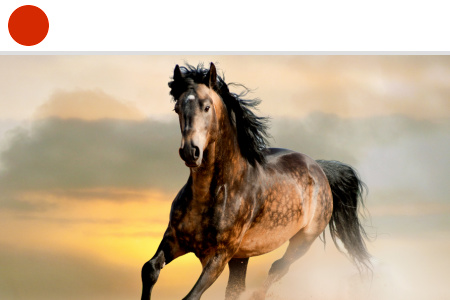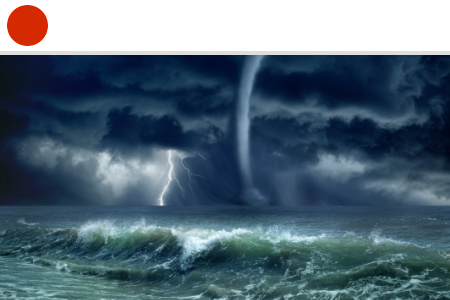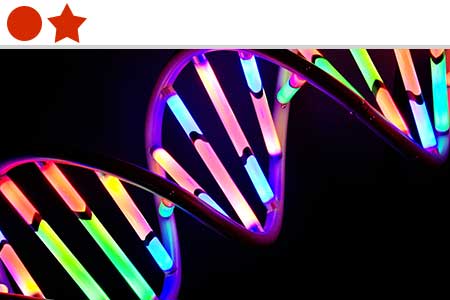This page focuses on the science resources you will find on SchoolhouseTeachers.com. Its goal is to help you find resources by skill or topic. For a complete list of our courses (including these), please visit the All Courses page.
Featured Resources

Science Experiments with Jason Lindsey (Grades 1–5)
Dive into more than 100 science experiments that demonstrate what you can do with basic household items in fun and easy experiments that will spark a love of science in your children.
Tinkers‘ Club (Grades 4–8)
Eight Tinkers’ Club homeschool science lessons challenge your curious students to build and invent. Put your curiosity to work as you take things apart and put them back together again in unique and unexpected ways.
Animal Science (Grades 7–12)
This Animal Science homeschool curriculum is for middle school and high school students who want to learn more in-depth information concerning animal species, habitats, and care. Taught by a practicing veterinarian, twenty-seven weekly lessons cover animal classification, digestive systems, reproduction, food animals, companion animals, human responsibility toward animals, and preventative care in domestic animals.
If you are on the verge of purchasing a microscope for your kids, then you need these helpful tips for how to use a microscope. Sheila also shares her top choices for microscopes and give you some key features to look for when searching for the right microscope that works for your budget.
Grade-Level Course Series
Many of the Exploring God’s World courses contain hands-on activities and labs to support the learning. Most of the Exploring God’s World courses are also available as iST courses.
Exploring God's World Courses
Red Wagon Science Series
All the Red Wagon courses may be taken as lab courses when used with the optional experiment lists or Apologia textbooks, as indicated in the course materials.

This list includes some of our science-focused Bible courses. For more on this topic, please see the Bible list on the All Courses page.
Dinosaurs and the Bible (Grades 3–6)
Dinosaurs and the Bible is a sixteen-week course presented from a Creationist worldview. It will try to solve some of the mysteries surrounding dinosaurs and dispel some of the myths. What do believers in the Bible do with dinosaur fossils? Those who believe in the Bible have been ridiculed and misunderstood for over 250 years. This class will attempt to set the record straight.
Apologetics: Creation vs. Evolution (Middle School–High School)
The Apologetics: Creation vs. Evolution class looks at more than 150 different reference materials examining the claims of evolution and Creationism. Each weekly lesson includes a video (approximately 30–40 minutes long) with study worksheets to complete. At the end of the course, there is also a test. Answer keys for the worksheets and the test are provided for parents. This course is designed for students 12 and older, and families are encouraged to take the class together and discuss what is being learned.
Creation Apologetics (Middle School–High School)
Creation Apologetics is a special series of videos from Creation Ministries International that draws on biology, chemistry, nuclear physics, astronomy, genetics, geology, history, and more to provide a defensible understanding of a belief in Biblical Creation. Most of these videos are designed for older middle school students and high school students. Some advanced material is also included. This class is a wonderful class to take as a family, as it is sure to spark many valuable discussions.
- Light Studies (Grades 1–5) by Suzanne Shera/Lightlab
- Creation Club Science (Grades 2–6) by David Rives and Kally Horn
- Creation vs. Evolution: Interpreting the Evidence (Grades 7–12) by Dr. Carl Wieland and Darren Nelson
- Independent Thought in an Evolution-Soaked World, Part 1 (Grades 9–12) by Dr. Alex McFarland
- Independent Thought in an Evolution-Soaked World, Part 2 (Grades 9–12) by Dr. Alex McFarland
- Intelligent Design: Why the Fuss, and What’s It About? (Grades 7–12) by Dr. Carl Wieland and Darren Nelson
- Where Did the Universe Come From? (Grades 9–12) by Dr. Alex McFarland
- Creation and Evolution Thoughts to Ponder (Grades 7–12) by Jay Schabacker
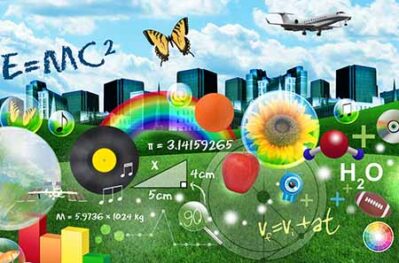
Small World Sensory Science (Preschool)
One of the ways preschoolers learn is by touching, feeling, doing, and exploring. That is what Small World Sensory Science is designed to help them do. Through twelve lessons, they will explore the farm, the pond, the ocean, wind, construction, and much more. Because sensory activities can sometimes be messy, there is a lesson on helping to keep things tidy, too!
Charlotte Mason Preschool (Preschool–Kindergarten)
Join Brittney Jordan for six four-week units that explore nature study themes and incorporate activities such as handicrafts, art, and living books to help you and your littlest ones enjoy purposeful play and fun time together.
Exploring God’s World with Kindergarten Science (Kindergarten)
Exploring God’s World with Kindergarten Science combines young children’s love of animals and nature with easy-to-follow short stories and tons of hands-on activities. From flowers to flies and cats to coal, enjoy ninety bite-sized lessons, conduct experiments, and have fun!
Having Fun with Kindergarten Science (Kindergarten–Grade 1)
Get ready to go on a journey of exploration! Through twenty-two engaging lessons and hands-on activities and experiments in this Having Fun with Kindergarten Science homeschool course, your student will have a chance to learn what a scientist does as well as learn about the world around him or her, including living and non-living things, life cycles, plants and animals, human senses, the weather, water, seasons, light, shadow, temperature, colors, and more.
Fun with Science (Grades 1–2)
Fun with Science is a great way to introduce your younger elementary students to basic life science, earth science, and physical science concepts. From body systems to volcanoes, the five senses to the states of matter, students can discover amazing facts about God’s creation. Lots of printable worksheets and hands-on activities are included.
Let’s Do Science Outside (Grades 1–4)
These fun supplements are perfect for any time you want to grab some schoolwork and head outside! Whether you looking for a simple craft to do outside or an artistic challenge like creating art out of rocks and natural objects, you’ll find twenty worksheets ready to print and take outside!
Nature Outdoors (Grades 1–9)
Explore twenty-two different parts of nature, from traveling seeds to coyotes, rainbows to winter weather. Plenty of hands-on activities are provided in this nature and outdoors homeschool science course.
Fun with Gravity and Climate (Grades 2–3)
These lessons include daily Bible reading from Genesis to help children understand gravity, creation, climate, and weather from a Biblical perspective as well as daily activities to reinforce their understanding. Each week, students complete activities such as writing assignments, printable activities, creating family treats in the kitchen, conducting research, and creating projects based on their research.
Scientists A-Z (Grades 4–6)
Scientists A-Z is a fun look at science through the lens of history. Each short lesson is followed by comprehension questions, activities, and additional resources that provide options for going deeper.
Kinetic Connections (For Parents)
Mother and home educator Edwina Moody shares practical tips to help you teach your hands-on learner virtually any subject from math to geography. Printables and additional resources are included.
- Silly School Songs (Grades 1–5) by Stephanie Rich and family

Science Experiments with Jason Lindsey (Grades 1–5)
Dive into more than 100 science experiments that demonstrate what you can do with basic household items in fun and easy experiments that will spark a love of science in your children.
Science Experiments with World Book (Grades 1–5)
Science Experiments with World Book is a fun way to get hands-on experience with science. Each science experiment includes the steps and instructions needed to complete it. Selected experiments also include video.
Tinkers’ Club (Grades 4–8)
Eight Tinkers’ Club homeschool science lessons challenge your curious students to build and invent. Put your curiosity to work as you take things apart and put them back together again in unique and unexpected ways.
Red Wagon General Science for Middle School (Grades 6–8)
This general science course is taught through online pre-recorded videos. Text instructions along with additional videos, experiments, online reading, crafts, etc., are included in order to provide students with the knowledge that science was created by God. This is done through a study of the history of science, scientific analysis, chemistry, physics, marine science, and more.
Red Wagon Physical Science for Middle School (Grades 6–8)
This physical science course is taught through online pre-recorded videos. Text instructions along with additional videos, experiments, and online reading are included in order to provide students with the knowledge that science was created by God. This is done through a study of the atmosphere, Earth, weather, Newton’s Laws, sound, light, and more.
Physical Science (Grades 7–9)
Through downloadable and online readings, experiments/labs, and hands-on projects, students explore the three main branches of physical science—chemistry, physics, and earth science. Topics such as elements, acids and bases, chemical formulas, force and motion, work and energy, electricity and magnetism, geology, oceanography, meteorology, astronomy, and more are explored.
Introduction to Forensic Science (Grades 9–12)
God has given us science to look at the world around us, and the ability to use what we learn to help the justice system stop the guilty parties. Using common household materials and approaching science from a Christian perspective, Introduction to Forensic Science investigates the process of testing or analyzing materials found at a crime scene and explores how forensic scientists evaluate evidence.
Friendly Chemistry: Laying the Foundation (Grades 10–12)
This Friendly Chemistry homeschool science curriculum can build a solid foundation for more advanced chemistry classes, while presenting chemistry in a way that is not hard or intimidating. Teens study the elements, atoms, electrons, and ions. The course can be combined with any other science curriculum to form a full year of study.
Life Science (Grades 10–12)
This full-year high school science course studies the basic topics of life science including the scientific method, molecules, organic and inorganic compounds, cell structure and function, cell division, plant and animal tissue, support and transportation systems in plants and animals, biospheres and ecosystems, biodiversity, and classification.
- Diet Pop and Mentos® Experiment (Grades 3–6) by Dr. Jay L. Wile
- Let’s Be Scientists: Simple Earth Science, Chemistry, and Anatomy Experiments (Grades 2–5) by The Old Schoolhouse®
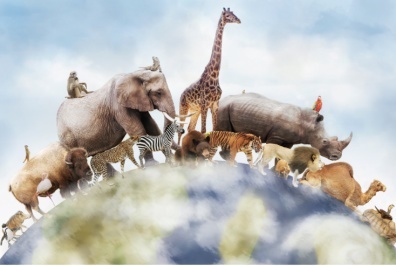
God’s Beautiful Creatures (Kindergarten–Grade 2)
Introduce your young learners to 120 of God’s most beautiful and amazing creatures! God’s Beautiful Creatures is a collection of the Hello, Beautiful! eBooks. Each book pairs beautiful colorful photographs with simple text that teaches about each animal. A photo index at the back of each book includes information about where the animal lives, what it eats, etc. Additional enrichment activities and links to maps of the countries where the animal lives are also provided.
Creation, Nature, and You (Kindergarten–Grade 3)
Creation, Nature, and You is a video-based supplement to an elementary science class. Students will take a closer look at seeds, soil, trees, fruit, and the wilderness in these eleven video specials.
All About Animals (Grades 1–2)
From jaguars to butterflies, introduce your children to a wide array of God’s creatures, where they live, what they eat, and what sets them apart from other animals. This class includes colorful text, puzzle pages, fun facts, activities, and more.
Lapbooking Through Science (Grades 1–3)
From farm animals to penguins, these mini science-themed lapbooks will introduce your younger students to human anatomy, healthy eating, and a variety of animals. Each lapbook includes basic lapbooking templates along with other activities.
A World of Animals (Grades 2–3)
From hamsters to hammerheads, this class takes elementary students on an engaging adventure through the world of animals. They’ll how these animals are classified, what they like to eat, whether or not they are endangered, and how to care for the animals that are possible pets.
Science All Around Us (Grades 2–3)
Science All Around Us is a fun series of stand-alone units meant to enrich your early elementary science classes. Units explore the world of plants and animals through topics such as the food chain, migration, hibernation, dormancy, camouflage, metamorphosis, pollination, and ecosystems. Lessons are brightly colored and include both hands-on and written activities.
Wonderful World of Bugs (Grades 2–7)
Wonderful World of Bugs is divided into four units that explore why we should study bugs, what exactly is a bug, the life cycles of butterflies and moths, and the practice of nature journaling. It includes hands-on assignments and also written assignments for families who choose not to bring nature indoors!
Curious Science (Grades 3–4)
From diamonds to quicksand, slime eels to fire ants, this 2-year (72-week) science series incorporates eighteen one-month unit studies that will intrigue, surprise, and fascinate students and parents alike. Designed for elementary grades, each unit includes language arts, math, science, art, Bible, and history for 3rd-4th grade, as well as activities for both younger and older students as well.
Weird and Wonderful World of Worms (Grades 3–5)
Weird and Wonderful World of Worms with Rosemarie Pagano brings you fourteen weekly lessons that explore the mysteries and complexities of one of our most underappreciated creatures—the worm. Learn about how they move, how they breathe, how they eat, and the many ways they impact our world. Discover both the good and the dangerous types of worms, learn about vermicomposting, and unearth a world of fun science.
Daily Discoveries (Grades 3–6)
Yvonne Blake brings an ongoing series of unit studies that explore various environments such as the forest, the seashore, and ponds. Each environment is studied for four weeks, with each week containing reading material, vocabulary exercises, math, writing prompts, and an activity.
Discovering Disgusting Creatures (Grades 4–6)
Ugh, Yuck, and Whoa! This is the perfect course for any child who loves bugs and snakes and things that are slimy. It’s also a perfect course for any student who desires to see God’s handiwork and creativity. The eight different sets of worksheets and World Book Online eBooks include disgusting creatures that are ugly, gross, rude, and strange. Students will also learn about animals’ defense mechanisms and ability to use camouflage.
Introduction to Life Science (Grades 5–6)
Don’t let the graphic nonfiction presentation style (comic book style) fool you! This course is packed full of information, illustrations that help clarify the concepts and facts, detailed diagrams, glossaries, and more.
Botany: Plant Science and Field Studies (Grades 7–10)
How did the plant “cell” get its name? What well-known Christmas “plant” is really a parasite? Our Botany: Plant Science and Field Studies course takes seventh through tenth grade students on a tour through the plant world to learn about roots and shoots, aquatic plants, conservation, plant defenses, and more using engaging text, activities and experiments, quizzes, and even field study of plants.
Animal Science (Grades 7–12)
This Animal Science homeschool curriculum is for middle school and high school students who want to learn more in-depth information concerning animal species, habitats, and care. Taught by a practicing veterinarian, twenty-seven weekly lessons cover animal classification, digestive systems, reproduction, food animals, companion animals, human responsibility toward animals, and preventative care in domestic animals.
Anatomy & Physiology (Grades 9–12)
This high school anatomy and physiology course takes a closer look at how and why the human body works and God’s remarkable design in the body’s tiniest details.
Friendly Anatomy (Grades 9–12)
Thorough knowledge of a subject area begins with a solid foundation. Veteran educator and large-animal veterinarian, Dr. Joey Hajda, builds this foundation with you in a gentle, friendly manner. Bone by bone, structure by structure, learn the anatomy of the bovine skeletal system. This is the perfect resource for the aspiring veterinarian or animal health technician.
General Biology by Core Academy (Grades 9–12)
This is a general high school biology course. The first semester includes a special introduction to science, human biology, ecology, and zoology. In the second semester, students will learn about botany, microbiology, cell biology, genetics, and origins. This course includes approximately 25 hours of video instruction, supplemental readings, and answer keys. A Christian, creationist worldview informs the lessons where appropriate.
Red Wagon Biology for High School (Grades 9–12)
This biology course is taught through online pre-recorded videos. Text instructions along with additional videos, experiments, and online reading are included in order to provide students with the knowledge that science was created by God. This is done through a study of the various kingdoms including Monera, Fungi, and Plantae; cellular respiration, ecology, and genetics. A discussion of evolution and its implausibility is provided.
Life Science (Grades 10–12)
This full-year high school science course studies the basic topics of life science including the scientific method, molecules, organic and inorganic compounds, cell structure and function, cell division, plant and animal tissue, support and transportation systems in plants and animals, biospheres and ecosystems, biodiversity, and classification.
Red Wagon Human Body for High School (Grades 11–12)
This high school human body course is taught through online pre-recorded videos. Text instructions along with additional videos, experiments, and online reading provide students with an understanding of cellular division, homeostasis, and the eleven systems of the human body, including the circulatory system, the endocrine system, and the digestive system. (The last module is about the reproductive system.)
Red Wagon Marine Biology for High School (Grades 11–12)
This marine biology course is taught through online pre-recorded videos. Text instructions along with additional videos, experiments, and online reading teach students about the marine world created by God. Beginning with a discussion of the ocean water and an overview of the types of organisms living in the oceans, this course moves on to discuss in more detail algae, protozoa, plants, and various marine invertebrates and vertebrates. Students are taught about marine ecosystems, tidal zones, estuaries, coral reefs, and more.
- Backyard Critters
- Ocean Study
- Creative Nature Study (Parents/Family) by The Old Schoolhouse®
- Learning Ladders: Terrific Trees eBook (Grades 1–2) by World Book
- Learning Ladders: What Living Things Need eBook (Grades 1–2) by World Book
- Animals in Disguise eBook (Grades 1–3) by World Book
- True or False? The Human Body eBook (Grades 3–5) by World Book
- Introduction to Human Body Systems (Grades 3–5) by various authors
- Animal Lives: Mammals eBook (Grades 3–5) by World Book
- True or False? Mammals eBook (Grades 3–5) by World Book
- True or False? Weird Plants eBook (Grades 3–5) by World Book
- Real Hummers: Hummingbirds and Their Design (Grades 3–6) by Jeannie Fulbright
- Sensational Sunflowers (Grades 3–6) by Stephanie Ruby
- Learning About Animals eBook (4–5) by World Book
- Insects and Spiders eBook (6–8) by World Book

Chemistry: All Things Matter (Grades 6–8)
Anna Crisostomo loves teaching middle school science and challenging her students to think and create! This twelve-week introductory course covers topics such as the physical and chemical properties of matter, the phases of matter, and more.
Chemistry Help (Grades 8–10)
Chemistry Help by Matthew Poston includes thirty-six short instructional chemistry videos (between 5 and 15 minutes in length), printable worksheets, printable answer keys, and video explanations of the answer keys. It is designed to help expand on topics typically studied in high school chemistry such as scientific notation, mass and weight, conversions, significant digits, covalent compounds, ions, polyatomic ions, ionic compounds, energy, states of matter, specific heat, and latent heat. It is not designed to serve as a stand-alone class but rather an in-depth tutorial for extra help and practice in key areas of chemistry.
Red Wagon Chemistry for High School (Grades 9–12)
This in-depth chemistry course is taught through online pre-recorded videos. Text instructions along with additional videos, experiments, and online reading teach students about solids, liquids, and gases; the states of matter; the periodic table and the naming of elements, atomic structure and molecular structure. Reactions between chemicals is discussed, as well as thermodynamics and kinetics.
Friendly Chemistry: Laying the Foundation (Grades 10–12)
Enjoy twelve lessons that provide text, video, practice pages, quizzes, and tests. Topics including an introduction to chemistry, atoms, electrons, ions, and quantum mechanics are discussed. Favorite labs of Joey Hajda’s Friendly Chemistry course are included! Have fun learning the basics of chemistry with Joey’s creative class.
Advanced Chemistry (Grades 11–12)
This advanced chemistry course covers all the basic topics of general chemistry. As an advanced course, it is suitable for grades 11-12 and would be best appreciated by a student who has already had a basic introduction to chemistry. This course includes approximately 25 hours of video instruction, supplemental readings, extensive practice exercises, and answer keys.
- Introduction to Mixtures and Solutions (Grades 4–6) by various authors

Everyday Astronomy (Kindergarten–Grade 12)
Travel to the sun, the moon, the planets, and the stars and explore outer space like never before. This multiple grade level course will get your student excited about Earth and the world beyond. From satellites to space ships and missions to observatories, astronomy will come alive through Bible verses, activities, crafts, videos, images, and even recipes.
Science of Our Planet (Grades 2–3)
Science of Our Planet is a short, supplemental unit designed to help you introduce your younger elementary students to some of the basics of earth science. From natural resources to the atmosphere to ecosystems, students can discover amazing facts about God’s creation. Printable worksheets and hands-on activities are included.
Wondrous Weather (Grades 3–5)
Wondrous Weather explores the science of weather conditions, the tools of meteorologists, methods of weather observation, and methods of weather forecasting. The class includes hands-on experiments, printable worksheets, and projects.
Experiencing Weather (Grades 4–5)
Can you learn about weather phenomena through picture books? Of course you can, with this five-part Experience Weather series. These five unit studies help kids learn about various weather phenomena including snowflakes, fog, rain, and wind through engaging stories and fun hands-on activities. They will also get an introduction to the geography and food of the British Isles, learn writing skills, learn about art, and much more.
Geology (Grades 4–12)
Patrick Nurre, owner of Northwest Treasures and a popular conference speaker, is offering audio/video slideshows and weekly worksheets to help you discover the amazing world that God has created. Unit 1 covering Rocks and Minerals offers sixteen weekly lessons explaining how to identify various types of rocks, the roles each type of rock plays in our world, and how geology points to a Creator. Unit 2 covering the Geology of Our National Parks offers sixteen weekly lessons. From glaciers to volcanoes, explore the vast wealth of geology found in the United States National Park System.
Earth Science (Grades 7–9)
Earth Science is a full-year course designed for students in grades 7-9. Each session consists of three different types of activities: video lessons to watch, notes for the student to fill out as he/she watches the video lesson, and a worksheet to complete that will help the student study for the quiz. Quizzes, as well as answer keys, are provided. The course will explore aspects of geology, oceanography, meteorology, and astronomy.
- Cold and Insulation
- Space
- Weird Weather and Natural Disasters
- Learning About the Sun, Moon, Planets, and Stars eBook (Grades 4–5) by World Book
- Learning Ladders: Nature’s Places eBook (Grades 1–2) by World Book
- Oceanography: Voyage Into a Marvelous World of Creation (Parents/Family) by The Old Schoolhouse®
- Watersheds and the Water Cycle (Grades 2–4) by various authors
- Learning Ladders: Weather eBook (Grades 1–2) by World Book
- True or False? Weather eBook(Grades 3–5) by World Book
- Out of This World (Parents/Family) by The Old Schoolhouse®

Introduction to Physical Science (Grades 3–4)
Whimsical characters introduce serious science in a fun way! Explore electricity, force and motion, heat, light, magnetism, matter and how it changes, properties of matter, sound, and more with engaging units and hands-on activities.
Introduction to Physics: Middle School (Grades 5–9)
Introduction to Physics: Middle School is an educational and entertaining Physics course designed especially for homeschoolers with hands-on activities and experiments to bring concepts to life. This eighteen-week course provides an introduction to gravity, friction, velocity, acceleration, Newton’s laws, electricity, magnetism, and more, while having more fun than you ever thought possible.
Red Wagon Physical Science for Middle School (Grades 6–8)
This physics course is taught through online pre-recorded videos. Text instructions along with additional videos, experiments, and online reading provide students with an understanding of velocity, acceleration, and displacement. They are taught how to understand and apply Newton’s Laws. They will also be shown how physics and math are connected. It is recommended the student complete algebra 1 and geometry and be familiar with sine, cosine, and tangent, as the later chapters include higher level math.
Physical Science (Grades 7–9)
Through downloadable and online readings, experiments/labs, and hands-on projects, students explore the three main branches of physical science—chemistry, physics, and earth science. Topics such as elements, acids and bases, chemical formulas, force and motion, work and energy, electricity and magnetism, geology, oceanography, meteorology, astronomy, and more are explored.
Red Wagon Physics for High School (Grades 9–12)
This physics course is taught through online pre-recorded videos. Text instructions along with additional videos, experiments, and online reading provide students with an understanding of velocity, acceleration, and displacement. They are taught how to understand and apply Newton’s Laws. They will also be shown how physics and math are connected. It is recommended the student complete algebra 1 and geometry and be familiar with sine, cosine, and tangent, as the later chapters include higher level math.
- Shocking Truth About Electricity (Grades 4–6) by David M. Jones
- True or False? Inventions eBook (3–5) by World Book
- Simple Machines (Grades 1–3) by Sheila Chairvolotti
- Story of Energy (Grades 3–6) by Bonnie Rose Hudson/WriteBonnieRose
- Understanding Light (Grades 3–6) by David M. Jones and John Grunder


